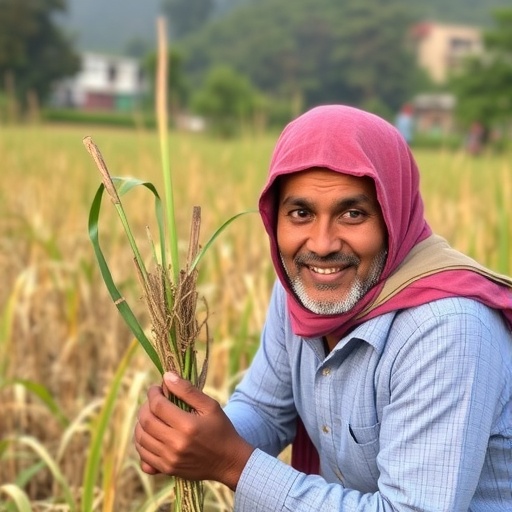In the face of accelerating climate change, small-scale farmers around the globe stand on the frontline, grappling with unprecedented environmental volatility. In Nepal’s Chitwan Valley, a region heavily dependent on subsistence agriculture, recent research exposes a paradoxical behavioral pattern among local farmers: when confronted with heightened climate risks—such as floods, droughts, and temperature extremes—they intensify their commitment to farming instead of diversifying their income streams. This finding, stemming from a comprehensive study led by a Penn State researcher, unveils critical insights into how risk perception shapes adaptation strategies in vulnerable agricultural communities and poses profound implications for climate resilience policy worldwide.
The study, published in the journal Population and Environment, illuminates the often-overlooked psychological and socioeconomic dynamics that influence agricultural decision-making in climate-stressed regions. Lead author Nicolas Choquette-Levy, an assistant professor of geosciences at Penn State, articulates that farmers’ entrenched reliance on agriculture—despite escalating environmental risks—is driven not by mere tradition but by a complex mixture of economic necessity, cultural ties, and limited trust in institutional support. This persistence reflects systemic barriers that constrain livelihood options for millions of smallholders, underscoring an urgent need for nuanced policy interventions to facilitate sustainable adaptation.
Nepal ranks among the countries most vulnerable to natural hazards globally, with smallholder farmers constituting a backbone of the local food system and economy. The Chitwan Valley, in particular, has experienced climatic shifts at rates surpassing global averages, including temperature increases nearly double the worldwide mean since the 1970s and significant declines in precipitation. These changes jeopardize staple crop yields—such as rice, maize, and wheat—upon which both local consumption and income rely. Yet rather than pivoting toward alternate forms of employment or income diversification, many households have exhibited a pattern of “re-embedding” themselves more deeply into agriculture as a risk-mitigation strategy.
This counterintuitive retrenchment may partly be explained through a detailed survey of roughly 500 farming households conducted in 2022, which revealed farmers viewed climate risks associated with non-agricultural livelihoods—like day labor or tourism-related work—as even more precarious. Extreme heat and erratic weather patterns threaten these alternative sectors, pushing farmers to double down on the familiar, if increasingly fragile, safety net of farming activities. Additionally, financial constraints limit access to inputs, insurance, and technology that could enable diversification, further entrenching this dependency.
Researchers highlight that the psychological impact of climate shocks—such as droughts and floods—is a key driver behind these choices. Experiences of crop failure have paradoxically spurred farmers to increase their focus on farming, propelled by fear of income loss and deep-seated mistrust of governmental emergency support and adaptation programs. This suggests that risk communication and extension efforts must transcend conventional educational approaches, systematically addressing trust deficits and tailoring guidance in alignment with local perceptions and realities.
Beyond the localized analysis, co-authors stress that these dynamics are emblematic of broader global challenges facing approximately half a billion small-scale farmers whose livelihoods are deeply intertwined with vulnerable agroecosystems. Climate extremes threaten food security, ecological sustainability, and rural economies, while inadequate adaptation can hasten urban migration and exacerbate poverty cycles. Michael Oppenheimer, director of the Center for Policy Research on Energy and the Environment at Princeton University, a co-author on the paper, emphasizes that despite ongoing governmental initiatives, current strategies fall short in fostering the widespread behavioral shifts required for effective climate resilience.
Policy-centered solutions proposed by the research team advocate for expanded access to real-time, locally relevant climate information coupled with financial mechanisms such as subsidized crop insurance designed to reduce the economic risks borne by vulnerable farmers. Moreover, facilitating safer avenues for income diversification—notably through promoting less climate-sensitive occupations—and encouraging techniques to spread agricultural risk over multiple harvest cycles emerge as pivotal strategies. These interventions, when implemented thoughtfully, could break the inertia locking farmers into high-risk farming practices.
Choquette-Levy’s recent return to Nepal in summer 2025 underscores the evolving nature of this inquiry, as he engages directly with policymakers to translate empirical findings into actionable investment plans. The dialogue between researchers and decision-makers reflects an increasing recognition that effective climate adaptation demands not only scientific rigor but also culturally attuned, community-centered approaches that empower farmers through enhanced agency and resources.
Interestingly, insights gleaned from Nepali smallholders may hold transferable lessons for family farmers in more developed regions, including Pennsylvania. Many crops cultivated in the Chitwan Valley—such as corn, apples, and various vegetables—are common across these disparate agricultural landscapes. By synthesizing indigenous climate knowledge from Nepal with technological innovation and entrepreneurial capacity present in developed settings, there exists an opportunity to foster hybridized models of resilience that bridge geographic and socioeconomic divides.
The broader implications of this research extend to global climate adaptation discourse by foregrounding the importance of subjective risk assessment in shaping livelihood choices. It challenges the assumption that rational economic actors will invariably diversify in response to environmental threats, revealing the intricate interplay of emotion, trust, and socioeconomic peripherals. As such, this study enriches our understanding of vulnerability and resilience among smallholder populations, paving the way for more effective, empathy-driven policy frameworks.
In summary, the persistence of farming as a primary livelihood amid severe climatic uncertainty in Nepal’s Chitwan Valley demonstrates the vital need to rethink adaptation interventions beyond mere financial investment or education. Holistic strategies must prioritize trust-building between farmers and institutions, provide accessible climate data, promote alternative income paths tailored to local realities, and mitigate risks through innovative insurance frameworks. Only through such integrative efforts can the precarious existence of small-scale farmers endure and thrive in an increasingly volatile global climate.
Subject of Research: Small-scale farmers’ perception of climate-related risks and livelihood adaptation in Nepal’s Chitwan Valley.
Article Title: Farmers’ Retracement to Agriculture amid Climate Crises: Insights from Nepal’s Chitwan Valley
News Publication Date: 2025
Web References:
References:
Choquette-Levy, N., Ghimire, D. J., Oppenheimer, M., Ghimire, R., & Dil C.K. (2025). Population and Environment. DOI: 10.1007/s11111-025-00493-8.
Image Credits: Not specified.
Keywords: Climate Change Adaptation, Small-scale Farming, Risk Perception, Livelihood Diversification, Nepal, Subsistence Agriculture, Climate Risk Communication, Crop Insurance, Food Security, Rural Development, Economic Resilience, Environmental Hazards




